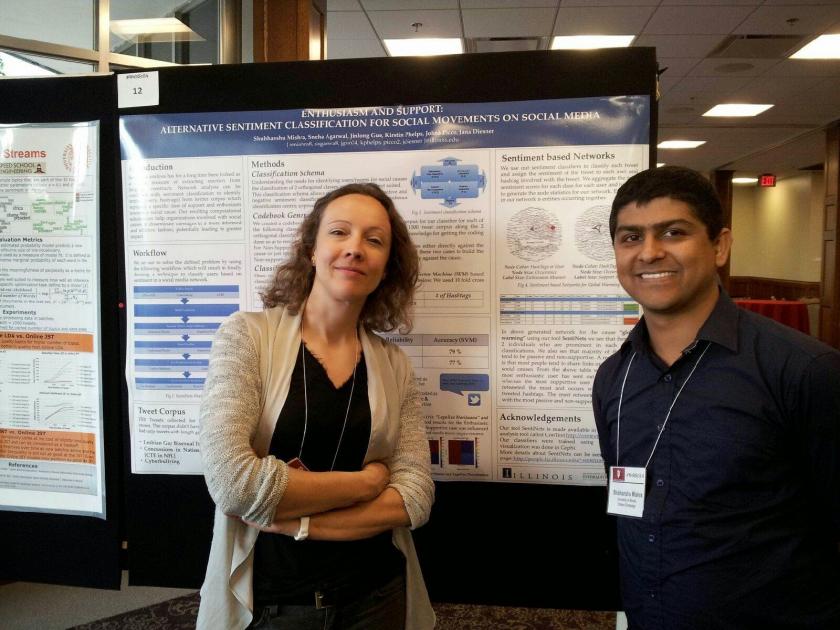
Assistant Professor Jana Diesner and GSLIS doctoral student Shubhanshu Mishra recently attended the ACM Web Science 2014 conference held in Bloomington, Indiana. They presented their paper, “Comparison of communication networks built from explicit and implicit data,” co-authored with Illinois engineering master’s student Amirhossein Aleyasen, as well as PhD candidate Aaron Schecter and Professor Noshir Contractor, both of Northwestern University.
Abstract: Social networks can be constructed from explicit information about who is talking to whom, and/ or inferred from the content of communication. How do the resulting network structures compare? We provided an answer to this question by constructing explicit social networks from chat logs and comparing them to implicit social networks built from text data generated by these agents. We apply different conceptualizations of similarity to the text data. This work helps to understand if explicit social networks (what people typically work with) can serve as a proxy for the true structure of communication networks. Our findings suggest that the more simplistic approach on the lexical level outperforms the more complex, topic-based approach. This means that reconstructing social networks based on lexical features is the best option tested, while detecting alternative and additional latent structures of people sharing the same topical knowledge requires looking for thematic clusters of word use.
They also presented a poster at the conference, “Enthusiasm and support: alternative sentiment classification for social movements on social media” co-authored with bioinformatics master’s student Sneha Agarwal, GSLIS doctoral students Jinlong Guo and Kirstin Phelps, and Johna Picco (MS ’14). By analyzing social media, specifically Twitter, they found that enthusiastic and supportive tweets are more prevalent in tweets about social causes than other types of tweets on Twitter. Mishra participated in a PechaKucha event at the conference, presenting a lighting talk about this work.
 “The conference not only involved the computational aspects of the field of web science, but also the need for greater interdisciplinary involvement of researchers from other fields,” said Mishra, who received the ACM SigWeb Student Travel award to attend the conference. “The presentations and sessions were a great blend of getting to know the social aspect of the information and research on the web along with introduction to new theories and solutions that can help in the advancement of web science research.”
“The conference not only involved the computational aspects of the field of web science, but also the need for greater interdisciplinary involvement of researchers from other fields,” said Mishra, who received the ACM SigWeb Student Travel award to attend the conference. “The presentations and sessions were a great blend of getting to know the social aspect of the information and research on the web along with introduction to new theories and solutions that can help in the advancement of web science research.”